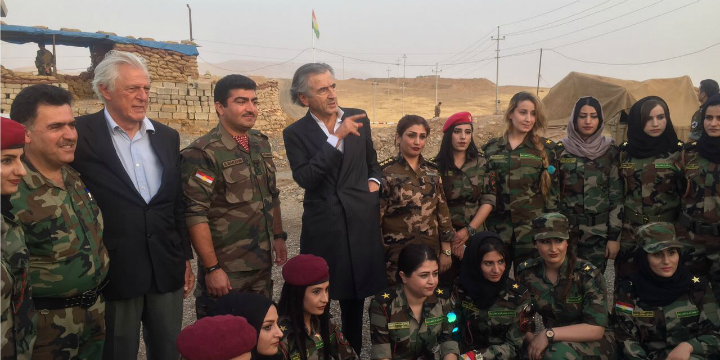In Mémoires de Guerre, General Charles de Gaulle wrote that great nations have no friends, only interests.
That is often true. We Kurds, who have so often been betrayed, know it better than anyone.
On the other hand, we have companions in arms, regardless of their nation of origin, who have shown up and stood with us in solidarity against tyranny, oppression, and the evil that afflicts us.
While there are many notable friends from around the world that deserve a mention, I will only allude to Bernard-Henri Lévy, who is one of the many prominent French friends of the Kurdish people along with the likes of Danielle Mitterrand, Bernard Kouchner, and Frédéric Tissot.
Why would we have so many prominent friends from France?
France is the country of la liberté. We Kurds are always seeking our liberty, but we are continuously denied. France is the country of the Rights of Man and of the right of peoples to self-determination; yet, that right is not accorded to us. Divided into four parts, we Kurds are living stateless on our own land. We have always been a people of resistance, just as France herself was. We are on par with France when it comes to resistance.
Our French friend, Bernard-Henri Lévy, embedded himself with my Black Tiger battalion in 2015 – 2016 and travelled the 1,000-mile front separating the Kurds from the Islamic State. The result of this journey was two documentaries, Peshmerga and The Battle of Mosul, in which he depicted the brave resolve of the Kurds in the face of barbarity and terror.
Despite accomplishing his task of filming for the documentaries, Lévy’s commitment to our cause has never wavered and his recently published book, The Empire and the Five Kings, is testimony to that. His book does justice to our secular struggle for independence, a struggle that we lost last fall.
The Islamic State was defeated in good part due to the two years of sacrifice by our courageous Peshmerga, who were stationed along the entirety of the front’s length.
We fulfilled our duty of protecting ourselves and the international community by standing in the face of adversity, but the world wanted nothing to do with us after the victory.
I have read long passages from the forthcoming English edition of The Empire and the Five Kings, in which Lévy measures the micro-event of our defeat in Kirkuk against the yardstick of universal history. He recognizes that nations looked upon us with indifference when the referendum was followed by unjust military force that led to the loss of Kirkuk. This is a great example of one of the silent tipping points in our history similar to antiquity, which are scarcely noticed albeit profoundly altering the course of history.
The relatively modest battle of Leuctra in the fourth century BCE, between four hundred Spartan warriors and the “sacred battalion” of Thebes, rung the final bell upon the Spartan hegemony over Greece. In another example, during the battle of Pydna in the second century BCE, the Macedonians were unable to escape the wrath of the Roman legions leading to the surrender of Alexander the Great’s successors.
Similar to Pydna and Leuctra, the abandonment of the Kurds last autumn was, for Lévy, one of those quiet historical moments. As a result, he argues a new order emerges when new actors take over from faltering ones, and the balance of power tilts. Lévy further argues that the old liberal Western order that had ensured the conduct of international relations in accordance with commonly accepted rules and values has fallen short of its own ideals when it defaulted on the mission that it had willingly borne.
He goes on to assert that the rival states of today, the heirs to a glorious past of ancient empires, are vengeful against the more recent Western colonizers. Moreover, they detest the modern liberal values and have already sensed that their time has come. They believe the balance of history has begun to swing in their direction.
The feeling that engrosses me and would engross any Kurd upon reading such a finely crafted work depicting our country as an overlooked center of universal history is an unexplainable sensation. Unfortunately, I believe that Lévy is correct. A perfect illustration of his thesis is the freedom that we have been brutally denied by our neighbors, whom the West has empowered.
The desert is expanding, he says. The shadows are growing longer. And my country, Kurdistan, is shrouded in the darkest corner of the night. He is right. The idea is a terrifying one that places a terrible weight on our shoulders, yet again I fear that it is true. We Kurds are living in the reality of receding democracies and rising autocracies. Every so often, we have lived that reality in its physical form.
I want to reassure our friends who value democracy and liberty around the world that we will never be the tiny, vulnerable people that certain others still dream of subduing and exterminating. We have and will continue to hold fast through the division, buffeting from history, and mistreatment by tyrants. We will remain a beacon for freedom and tolerance.
You say that today’s empire has abandoned us to neighbors who had been eagerly awaiting the moment? You say that five new kings covet irredentist empires and their peoples, intending to colonize their souls? And that we are an example of the process? That may well be, but we have not stopped resisting to survive. And with the aid of our friends and allies in the United States, France, Europe, and elsewhere, the ill winds of history that now blow so close to us will not carry us away.
Major General Sirwan Barzani is the commander of the Peshmerga’s Black Tiger Battalion.
Translated by Steven B. Kennedy

